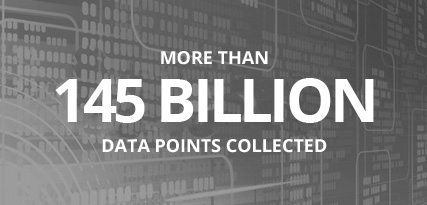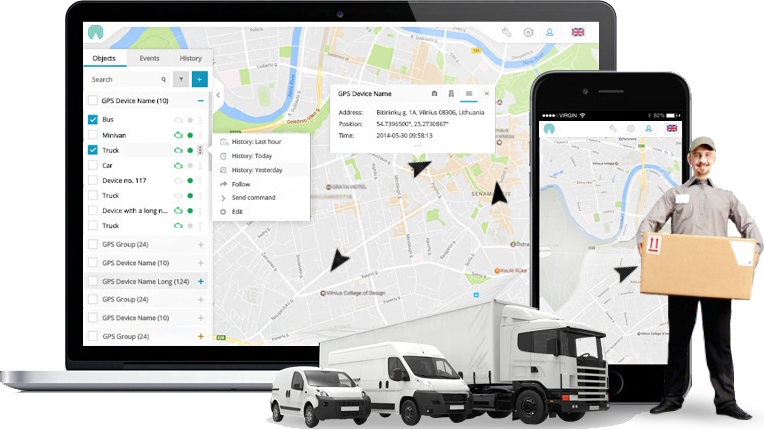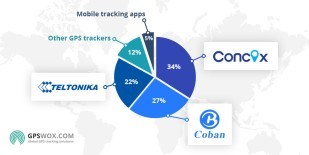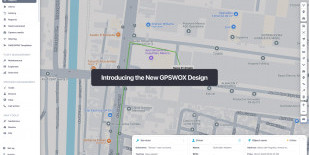
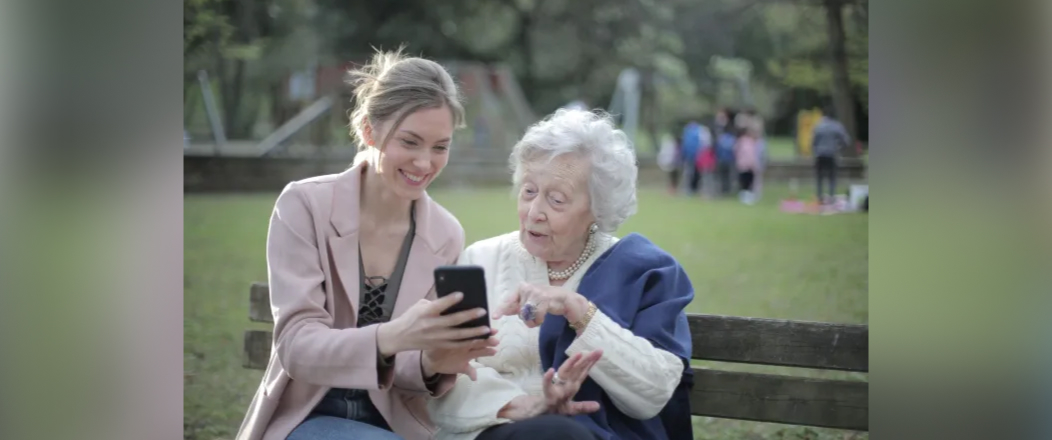
Looking After the Elderly with GPS Trackers
While a long and happy life is all one can wish for one’s elderly loved ones, it is natural that seniors will often require assistance to lead a safe and peaceful existence into their old age. Studies show that two thirds of all elderly adults need help when performing one or more daily activities. Ensuring the well-being of the elderly can greatly help them enjoy the last chapters of their life, and it is hard to think of a more noble endeavor.
It goes without saying that it takes maturity and effort to navigate the challenges that can be presented as a professional caregiver, or when looking after one’s own aging family members. However, thanks to innovative technological solutions, some of the weight can be taken off of one's shoulders.
While you may not instantly think to associate GPS trackers with caregiving, it could come as a surprise that such devices can have a significant impact on giving guardians peace of mind, as well as providing a sense of security for the seniors themselves. In this article we will explore how GPS tracking technology can play a major positive role when looking after the elderly and why it surpasses being a mere tool, but rather establishes itself as a medical ally.
The Challenges of Caregiving
There are many health concerns that come with aging. These can turn simpIe, daily tasks into considerable challenges to overcome. Chronic conditions such as Alzheimer’s, dementia, Parkinson’s, and other serious afflictions can heavily impact the capabilities of seniors to take care of themselves. Cognitive decline, as well as diminished mobility are other factors that can increase the time and attention necessary to ensure the elderly are able to maintain a functional life.
Unfortunately, wandering is a common behavioral tendency that comes with the aforementioned issues. Six in 10 people with dementia will wander at least once, but many do so repeatedly. Wandering, along with the risk of getting lost can prove to be very problematic. Such tendencies can lead to a variety of dangerous situations like the risk of falling, getting lost, dehydration, traffic accidents, drowning, or other injuries. This also places a significant emotional burden on professional caregivers and the families of the eIders.
However, even less serious conditions such as memory loss, confusion induced by medicines, and cognitive decline can complicate caregiving. These can affect the ability of seniors to navigate around their familiar surroundings, increasing the possibility of getting disoriented and wandering.
Most of the recommended solutions, due to their limitations, tend to leave gaps in ensuring the proper safety of the affected seniors. Alarms, locks, and other traditional methods fall short of providing a comprehensive approach to monitoring the elderly, as well as informing caregivers to check in before anything dangerous can happen.
Thoroughly understanding the challenges that come with caregiving shows why more advanced solutions are needed to guarantee a wholesome experience for everyone involved. Luckily, technology has come far enough to provide methods that have a much more dynamic approach when it comes to adapting to the needs of the elderly.
The Role of GPS Trackers in Caregiving
To appreciate why GPS trackers can have a positive impact on caring for the elderly, it is important to understand how these systems function. GPS (Global Positioning System) technology uses satellite signals to pinpoint the exact location of an individuaI. Such accurate location data is the foundation for what makes an effective, capable monitoring system.
While GPS units come in various shapes and sizes, there are devices tailored to the unique needs of monitoring the elderly. Their design and functionality is centered around being as unassuming as possible so that they do not intrude on the daily comfort of the wearer. GPS devices for the elderly are mostly small in size, comfortable to wear, and they tend to have a long battery life. However, this depends on the range of their functionalities. The latter is a key feature when choosing a GPS unit because it minimizes the burden of having to charge the device while providing a maximum amount of uninterrupted tracking per cycle.
Employing a GPS device in caregiving can have a profound impact to instilI a sense of safety for both sides. The ability to access real-time location data on the whereabouts of their elderly family members is incredibly reassuring. The same goes for seniors - the fact that their guardians always know where they are can provide an additional sense of comfort. In the case of an emergency situation, it also allows for a fast response due to the smart features found in modern GPS devices.
Real-time Location MonitoringPrecise location monitoring enables caregivers to locate seniors around the clock. This can reassure professional caregivers, families, and the elderly individuals that immediate action can be taken in case of an emergency.
Geofencing Safe ZonesModern GPS trackers for seniors have a feature that allows guardians to establish virtual boundaries. These marked territories, known as geofences, enable caregivers to instantly be informed about when the elderly individual is entering or leaving a predefined zone.
Emergency Alerts and NotificationsGPS trackers can send out immediate notifications if there is an emergency. A deviation from an established routine, a sudden fall, or an elderly person wandering into unsafe areas can instantly be reported to caregivers through phone or email notifications. This empowers them to immediately take action and remedy the situation at hand. Additional data such as low battery warnings of the GPS tracker can also be reported.
Voice Call FunctionDedicated trackers for the elderly can also come with easily accessible SOS alert buttons that allow seniors to signify they need help with as little as a push of a button. Specialized trackers can also feature two-way voice call, automatic pickup speakerphone, as well as voice to text functions, therefore making a rapid emergency response possible with minimal effort.
The integration of such powerful monitoring features is a profound step up in caretaking. Not only do GPS units monitor the affected elderly, but they make an active contribution to the well being and safety of the individual. It could be said that GPS units tailored for monitoring seniors perform the job of an additional caretaker that is always by the senior’s side, providing important data that adds a sense of reassurance, and can potentially save lives.
Picking the Right GPS Tracker for Seniors
To make sure that you get the optimal experience, it is important to select an appropriate GPS tracker that is suited for the task of working with the elderly. While it is wise to pick a tracker specifically designed for the job, many models do support the main functions relevant to supervising seniors. Namely, real-time tracking, geofencing, and notification alerts. Here are some of the key features to look out for when selecting a GPS tracker for senior citizens:
Size and ComfortIdeally, you want to integrate the GPS device into the life of the elderly person as seamlessly as possible so it does not cause any major inconvenience. Therefore, it is best to make sure that the device is lightweight, small, and designed for comfortable wearing. Devices for the elderly are available as watches, pendants, belt attachments, or as small units to store in one’s pocket. The former options will provide a more secure hold, while being easily accessible in case of an emergency.
Battery LifeThe battery life of a GPS tracker depends on the size of the unit, as well as how many functions it supports. Typically, advanced GPS trackers for the elderly can actively work for around 1-7 days on a single charge, with up to 75 days in battery saving mode. These are rough guidelines to look out for. Keep in mind that while rudimentary devices may be able to actively track for months on a single charge, they will compromise on the number of features. This is fine if you are only looking to cover basic GPS tracking needs.
User Friendly InterfaceOne should take into account the user friendliness of the device so that it is easy to navigate for both the elder directly, and the caregiver on the GPS software side. An intuitive interface with big buttons and a large, bright display is optimal. Dedicated GPS trackers for the elderly are designed with ease of use in mind, therefore making it a much better choice than conventional asset trackers.
Water ResistanceNot all trackers are inherently waterproof. Depending on your preferences, you should make sure that it can withstand moisture and dust. An ingress protection (IP) rating of 65 will ensure sufficient protection for daily use. However, the higher the rating, the better it will withstand full water submersion.
Fall DetectionAutomatic fall detection is an important feature to have in a GPS device meant for the elderly as it is in direct correlation to the health of a senior. Upon an incident occurring, this feature notifies caregivers immediately. Many of the best GPS trackers for seniors are equipped with fall detection, but one should make note to double check.
ConnectivityTo allow notifications and voice calls, GPS trackers employ cellular data by means of a SIM card. When picking a tracker, it is advisable to look for one that supports 4G/5G and WiFi. This ensures faster update speeds and overall reliability when sending and receiving notifications. When it comes to voice calls, it is highly advisable to seek out a unit with an auto pick up speakerphone function. In the case of a fall or injury, this feature allows one to communicate with the senior without necessitating manual movements to accept the call.
CostThe cost of a GPS tracker for older adults can range from $0 to $400. Some devices are a one-time purchase, while others require a monthly subscription fee to work. Subscription rates for GPS devices tend to be in the range of $10 to $40 dollars. Considering the variety of pricing options, it is advised to investigate the payment model in advance.
Free Alternative via Smartphone
We would like to note that there also are free alternatives for tracking one’s elderly family members. While these do not provide the entire list of available features, they do a great job at basic location tracking by utilizing one’s smartphone as an indicator. Apps such as GPSWOX Family Locator can offer basic GPS tracking, as well as alerts when a family member enters and leaves designated areas at no cost. This makes for a superb option if you are just looking for simple but reliable GPS features to track your family members.
The Best GPS Trackers for Seniors - Our Recommendations
AngelSense GPS Tracker Watch for Elderly, Dementia, & Alzheimer’s
Price: $229Subscription Cost: $44.99 (annual contract) - $64.99
The AngelSense, while on the pricier side, is a top of the line device that is well made and reliable. It has all the modern features one could ask for - live location tracking, auto pick up speakerphone, an unlimited number of assignable guardians, fall detection, alerts and geofencing, an SOS button, as well as 4G and WiFi access. It updates the GPS location every 10 seconds. Additionally, it employs AI technology to provide a wide range of proactive alerts to stay ahead of any potential emergencies, as well as when the elder deviates from his schedule. The AngelSense Wearable can run up to 24 hours, whereas the AngelSense Watch can run up to 16 hours on a single charge.
| Pros: | Cons: |
| Small & Comfortable | Low Battery Life |
| Well Made | Expensive |
| Feature Rich | |
| AI Assistance |
SecuLife Personal GPS Tracker for Elderly, Dementia, & Alzheimer’s
Price: FreeSubscription Cost: Basic $15.20 - $19, Elite $31.20 - $39
The SecuLife is another great option that has an auto pickup speakerphone, which is a big bonus. It comes in many forms, including a pocket device, wristband, and smartwatch. The device is able to send out alerts, has geofencing, timeline histories of daily trips, supports 4G, 5G, and LTE U.S.. The basic subscription plan includes 5 minute interval GPS location updates and 60 minutes of talk time. The elite plan includes unlimited talk time and 30 second GPS location update intervals. The device can run 8-24 hours on a single charge.
| Pros: | Cons: |
| Comes Free | Low Battery Life |
| Small & Comfortable | |
| Feature Rich |
Caring for the elderly is something that many have to face, whether it be for one’s own family members, relatives, or professionally. Anyone having to guard seniors will know that it can present many challenges that require a lot of attention. Especially seniors affected with more serious afflictions such as Alzheimer’s, Parkinsons, or dementia need special care that can’t always be provided 24/7.
Modern GPS trackers can bridge the gap by fulfilling the role of a technological caregiver that looks out for elders around the clock. Their advanced functionalities, such as geofences, fall detection, SOS button, and voice call capability can greatly aid in providing families and seniors additional peace of mind. The added sense of security is surely worth an investment as it enhances the quality of one’s life. If you are willing to compromise on some of the advanced features, GPS trackers for seniors can be found for every budget. However, even free alternatives such as the GPSWOX Family Locator can cover the basics of real time location tracking and provide notifications upon family members arriving at destinations.
We hope that we succeeded in providing you with some insight on how GPS trackers can aid in helping seniors live a more graceful life into the last chapters of their lives. It is encouraging to see that modern technology is evolving at a rapid pace, and it translates to helpful practical applications. Current top of the line trackers are already able to provide an astounding amount of functionality to alleviate part of the burden for caregiving families and seniors experiencing impairments. This helps facilitate an invaluable sense of peace. It is exciting to think about what developments the future holds when it comes to caregiving technology, and you can be sure that we will keep you updated on any exciting news coming our way.


